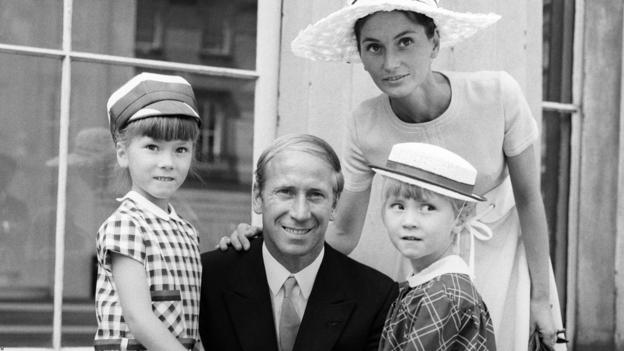Sir Bobby Charlton: Family man, football hero, statesman – MyCyberBase


You can tell a lot about the true character of someone by the pictures used to mark their passing.
The public commemoration service to mark the death of Sir Bobby Charlton was a global event. You knew that by the number of TV crews present, both at Manchester Cathedral and Old Trafford.
It was also evident in the stature of some of the people who turned up, which included Prince William, England manager Gareth Southgate and Aleksander Ceferin, president of European football’s governing body Uefa.
You could also tell the enormity of what we were witnessing by the number of ‘ordinary folk’ who turned out on a blustery, grey north-west day to pay their respects to the man who, until relatively recently, was Manchester United and England’s record goalscorer and whom, along with long-time team-mate Nobby Stiles, remains one of only two Englishmen to have started – and won – World Cup and European Cup finals.
On the front of the commemoration booklet there was the smiling Charlton, resplendent in black tie, every inch the statesman and ambassador, which is what he eventually became as he toured the world representing club and country.
On the back was a younger Charlton, blond hair blowing in the breeze, before he needed the combover, wearing the distinctive red and white kit so synonymous with his illustrious playing career.
But inside was Charlton the family man, with wife Norma and children Suzanne and Andrea, posing after receiving his OBE at Buckingham Palace in 1969.
It was that side of Charlton that played such a key element in the final public chapter of an extraordinary life.
Although there were so many cameras outside the Cathedral there were none inside, with Norma wishing the event to be as private as possible before a final family service on Tuesday.
It was also emphasised in the moving and articulate tribute of Charlton’s grandson, William Balderston, who spoke of the “jelly and custardy” stories he used to hear when he jumped on to his grandad’s knee. He also told of the snowy day when Grandad leapt on his sledge and went downhill at an “insane” speed, before racing back up the hill as quickly as possible so no-one missed their go.
This is the real-life Charlton, the role he was, by all accounts, at his most comfortable and relaxed, away from the glare of publicity – even though his ability on a football pitch meant his name was enough to spark a conversation in the most remote places.
Charlton’s legacy will stand the test of time. Three league titles, one European Cup, a World Cup, 249 Manchester United goals, 49 for England. A survivor of the Munich air crash in 1958, in which eight of his team-mates were among 23 people who lost their lives, a moment that changed United – and Charlton forever.
But there was more to him than that.
As United’s former chief executive David Gill explained in his eulogy, Charlton was a reminder of a less aggressive and less complicated time.
“The stat I really like is only two bookings and never being sent off,” said Gill. “To me that says it all – you can be a superstar and a fierce competitor while still being a gentleman. Bobby’s name is synonymous with all that is good about the English game.”
It should be no surprise Sir Alex Ferguson should choose the occasion for one of his first public outings since his wife Cathy’s death last month, nor that he should declare: “If it wasn’t for Sir Bobby I wouldn’t be here.”
And, as Gill recounted, given Ferguson’s ebullient jocular nature and Charlton’s more measured putdowns, it was perfectly in keeping that the Englishman would scoff when the Scot remarked that between them, the knighted pair had 107 international caps. Charlton had 106 of them.
The third tribute to Charlton came from Manchester United Foundation chief executive John Shiels, who revealed he first came across this legendary football figure when he began to work for one of his soccer schools in the 1970s which, he said, were visionary.
In addition to highlighting Charlton’s non-football activities, as diverse as a local children’s adventure farm and landmine clearing in conflict zones, Shiels too spoke of the human side of a thoroughly decent man.
“He was the ultimate professional and had impeccable manners,” he said. “In all my time with him, I don’t think I heard him raise his voice or use a swear word.”
The nearest we heard of an edge to Charlton’s character was Gill’s assertion that “he always liked a free beer”.
Both inside the Cathedral and out, there were so many heartfelt epitaphs paid to Charlton’s life, but it was possibly Reverend Grace Thomas who best summed up his legacy.
“It is my job to try and articulate what all this means,” she said.
Thomas admitted she was straying very close to rival – Liverpool – territory when she spoke of people who have lived good lives “not being alone” as they pass on their journey.
She was not speaking of Charlton the footballing superstar, or Charlton the global icon. She was speaking of Charlton the humble family man, who never lost his north-east accent, never got too carried away with himself and never bored his grandchildren with tales of what he did on the pitch, even though he could have gone on about it for hours if he so wished.
“Sir Bobby rest well,” she said. “You are in good company.”

, 2023-11-14 12:40:43 ,
#Sir #Bobby #Charlton #Family #man #football #hero #statesman
for more interesting Article Visit regularly : https://mycyberbase.com/





